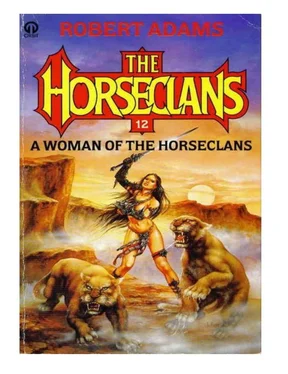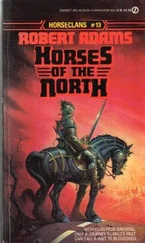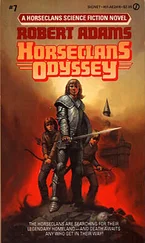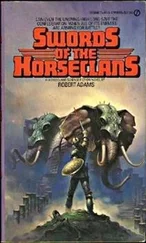Robert Adams - A Woman of the Horseclans
Здесь есть возможность читать онлайн «Robert Adams - A Woman of the Horseclans» весь текст электронной книги совершенно бесплатно (целиком полную версию без сокращений). В некоторых случаях можно слушать аудио, скачать через торрент в формате fb2 и присутствует краткое содержание. Жанр: Фантастика и фэнтези, на английском языке. Описание произведения, (предисловие) а так же отзывы посетителей доступны на портале библиотеки ЛибКат.
- Название:A Woman of the Horseclans
- Автор:
- Жанр:
- Год:неизвестен
- ISBN:нет данных
- Рейтинг книги:4 / 5. Голосов: 1
-
Избранное:Добавить в избранное
- Отзывы:
-
Ваша оценка:
- 80
- 1
- 2
- 3
- 4
- 5
A Woman of the Horseclans: краткое содержание, описание и аннотация
Предлагаем к чтению аннотацию, описание, краткое содержание или предисловие (зависит от того, что написал сам автор книги «A Woman of the Horseclans»). Если вы не нашли необходимую информацию о книге — напишите в комментариях, мы постараемся отыскать её.
A Woman of the Horseclans — читать онлайн бесплатно полную книгу (весь текст) целиком
Ниже представлен текст книги, разбитый по страницам. Система сохранения места последней прочитанной страницы, позволяет с удобством читать онлайн бесплатно книгу «A Woman of the Horseclans», без необходимости каждый раз заново искать на чём Вы остановились. Поставьте закладку, и сможете в любой момент перейти на страницу, на которой закончили чтение.
Интервал:
Закладка:
She, of all people, knew just how long and hard and how unstintingly her own dear dead Tim had worked in building up the power and image of the clan of his birth. He had devoted much of his life to making the small, insignificant Clan Krooguh large and rich and widely respected by Kindred and non-Kindred alike, and she would not sit idly by and watch her grandson’s senselessly prolonged grief undo that work.
She set herself to the task. For two long years, she argued and debated and wheedled with Chief Sami. Then, when she fell the time to be ripe, she exchanged one of the last two of her remaining gold discs for a young, pretty, black-haired, dark-eyed slave girl who had chanced to be part of the merchandise brought west by a train of plains traders.
On the way back to the chief yurt, Behtiloo discovered to her chagrin that the girl spoke no single, recognizable tongue, aside from a few mispronounced words of Trade Mehrikan. At last, almost in desperation, Behtiloo tried to mindspeak.
“What is your name, child? What is your race? What tongue do you speak?”
A rapid-fire spate of foreign words poured from the girl’s dark-red lips, but Behtiloo was able to glean their meaning from the mind behind them: “Please, old woman, mistress, how can you speak to me without opening your mouth? I don’t … can’t understand how … ?”
Again, Behtiloo used telepathy, keeping in mind her own honest bewilderment when, so many years ago, she first had encountered Horseclans mindspeakers. “There is no need to speak aloud, little one. Think what you wish to convey to me, then merely project it. See, like this.”
It quickly became apparent that like Behtiloo herself, the little slave girl had been born with a dormant potential for mindspeak and had needed only instruction in its use. By the time she had had the girl make use of the sweat yurt, wash her body and hair and assume Horseclans garb, Behtiloo was easily engaging in silent conversation with her and had had all of her bitter story, though parts of it had been most difficult for the old nomad woman to credit, on the basis of the prairie life which was all she had ever known.
Leenah Goombahlees had been born far, far to the east, in a great huge place built of stone and brick, tiles and timbers. In this place, people—more people than all of thirty or forty large clans’ number—lived out their lives, only leaving, some of them, to till the fields, tend to the flocks and herds and vineyards outside the high, stone walls that surrounded the place, which was called a “city.”
Then, of a day, a vast host of warriors had marched down from somewhere in the north and camped on the hillsides all around the city. Leenah recalled that time in vague snatches—of her father and her brothers tramping in and out of the house at odd hours, all sheathed in shining steel, with swords and daggers at their belts and spears and axes in their hands; of her eldest brother being brought home, shrieking in agony, to die within hours of the great ragged wound torn in his belly; of a long time when no one had much of anything to eat and it had seemed that every other building was burning.
And then the day of ultimate horrors had come. Her father had run stumbling into the main room of the home, his black eyes blazing, wild, his helmet with all the pretty feathers gone and his armor no longer shiny, but nicked and deeply dented and dull with a profusion of crusty red-brown stains.
Leenah had seen him embrace and kiss her mother, then push her to arm’s length, draw his sword and run it deeply into her body below her breasts. Leenah’s older sister had screamed then, and turned to run; but her father, in a single, fluid movement, had drawn and thrown a dagger with such force that all of the slim blade had buried itself in her sister’s back, and she had fallen, twitching, to the blue—and-white tiles.
Too stunned to run, Leenah had simply stood as her father turned toward her, raising his bloody sword, his lips moving but no sound issuing from between them, pure madness shining from his eyes. Then, with an awful clanging and clattering, his body had fallen face downward at her feet, with the short, thick shaft of a war dart standing up from the spot where Spine met skull.
Suddenly, too suddenly, the room was filled with strange bearded foreigners, all garbed in armor and clothing of unfamiliar patterns….
When Behtiloo had tiled to prod the girl for more facts after that point in the tale, she could only arouse an inchoate confusion of memories of pain and terror and shame, of a sick and churning disgust. Then the girl had begun to cry, softly, at first, then with increasing violence.
Once the little slave had cried herself out in Behtiloo’s comforting arms, her mind got around to producing the sad end to her story.
After a week of rapine, torture, looting and murder, the victorious besiegers had boated the few hundred survivors of the intaking of the city across the nearby river and had then marched them northward to a rendezvous with traders, who had bought most of the war captives.
Leenah had been but one of some threescore women and girls bought by men who fed them, gave them clothing to replace their tattered rags and allowed them to rest for a few days before loading them onto wagons to begin a westward trek of many weeks’ duration.
All of the captives were used by their new owners from time to time during the trip, but no other violence was wrought upon them. They were not beaten, they were fed as well as the new owners ate, and those who happened to become ill were treated with solicitude. Finally, the wagons came down from the mountains they had traversed and rolled into a riverside town, where the captives and captors boarded the two biggest boats Leenah had ever seen.
The trip, in toto, had taken months. It had seemed to Leenah and her fellow slaves that the twisting, turning river was endless. Moreover, stops were frequent.
At most stops, men would come aboard the boats. They would be shown the “merchandise.” gold or silver coin would change hands or a few bales and crates would be winched or carried aboard, and some of the women would go ashore.
After about two months (as near as she could reckon time) on the river, Leenah had become ill, desperately ill. Rightly fearful of possible contagion, her owners had moved her to a small cubicle abovedecks and cared for her as well as they knew how, but she had nonetheless been slow to recover and had still been far from well when the boats were current-borne into an even larger river.
Using their sails, the two boats beat into a small port on the larger river. There the traders, their goods and the score or so of remaining female slaves were transferred to a number of smaller boats—boats propelled by long, heavy oars pulled by the wretched, filthy, sore-covered men chained to them. They traveled against the current of the swift-flowing river for about a week before arriving at the docks below the walls of a bustling town.
After disposing of about half their remaining women, the traders loaded the rest into high-wheeled plains wagons, along with a vast assortment of hard and soft goods and joined with a well-guarded column of similar wagons for the long and hazardous trek westward in search of the nomad clans and the wide-scattered farming settlements along the prairie fringes.
Once the train had reached the territory of the Kindred, the Horseclans, wherein there was greater safety for traders (honest ones, at least) and smaller trains could proceed with fewer guards, the large caravan had split into several smaller ones and headed off in different directions, each group taking two or three of the women slaves.
“Please, mistress,” Leenah silently beamed, “why did you buy me? Am I to be your personal maid? To care for you?”
Читать дальшеИнтервал:
Закладка:
Похожие книги на «A Woman of the Horseclans»
Представляем Вашему вниманию похожие книги на «A Woman of the Horseclans» списком для выбора. Мы отобрали схожую по названию и смыслу литературу в надежде предоставить читателям больше вариантов отыскать новые, интересные, ещё непрочитанные произведения.
Обсуждение, отзывы о книге «A Woman of the Horseclans» и просто собственные мнения читателей. Оставьте ваши комментарии, напишите, что Вы думаете о произведении, его смысле или главных героях. Укажите что конкретно понравилось, а что нет, и почему Вы так считаете.












